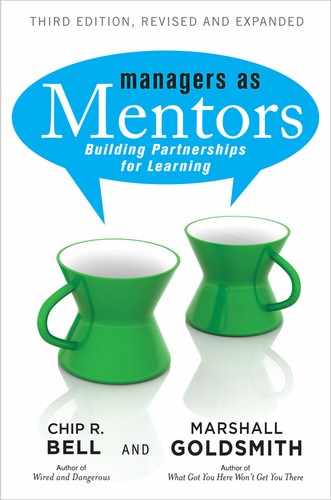Index
abundance, 26
Adams, Abigail, 19
advice, 129–134
affirmation, rational, 97
Allen, Steve, 68–70, 71, 72–73
Almeida, Joe, 163–165
arduous alliances, 197–204
Arendt, Hannah, 155
authenticity, trust-building, 69–70
Bernick, Carol Lavin, 175
Billings, Josh, 67
Black, Tracy. See “Mentoring in Action” vignette
Blanchard, Ken, 135
blind spots, reporting on
feedback, 135–138
feedforward, 138–144
body stance, 119
bosses, mentoring by, 216
bosses, mentoring of, 191
boundaries, busting, 28–31
brain
understanding-seeking questions and, 100
buddy system, 200–201
calmness, 82
care packages, 201–202
case studies
Deanna Mulligan, 121–123
Fred Hassan, 183–185
Joe Almeida, 163–165
Liz Smith, 87–89
Mark Tercek, 51–54
Cassie (granddaughter of Chip Bell), 107
Castaneda, Carlos, 6
celebration, 180
champions, growing, 175–178
clarifying questions, 115–116
climaxes, of stories, 159–160
coaching vs. mentoring, 2
codependency, 168
communication
judgment-free, 96–97
trust-building, 72–73
Confucius, 169
context, story, 158–159
courage
invitations to risk and, 93–97
as quality of good mentoring, 26
uncovering, 84–85
creative discovery, 100
credibility, trust-building, 70–72
curiosity, 105
Curtin, Steve, 125–126
Dances with Wolves, 194–196
Dass, Ram, 6
Denver, John, 187
description, in storytelling, 161
dialogues, 113–120
dissonance, in storytelling, 159
dominance, on Mentor Scale
balance and, 152–153
inquiry talents and, 102
dramatization, in storytelling, 160
Dunbar, John, 194–196
dynamic modeling, 94–96
“The Eagle” (McNally), 222
e-mentoring, 203–204
ending mentoring relationships, 179–181
Estep, Mike, 177
ethics, 26–27
exaggeration, 161–162
extending, 4, 33, 118, 167–168
family, as component of expansive learning environment, 30–31
FAQs, 216–219
fast-paced environments, 197–199
fear, 79–85
feedback, 135–138
feedforward, 138–144
feeling, as component of expansive learning environment, 30
fellowship, 170
The Fifth Discipline (Senge), 5, 31
fight-or-flight reaction, 82–83
FIRO-B® test instrument, 48
focus
as component of expansive learning environment, 29
listening skills and, 109
on purpose, 145–148
in storytelling, 161
follow-up, 181
freedom, as component of expansive learning environment, 31
Fritch, Bruce, 56
Gadiesh, Orit, 62
Gamble, Jack. See “Mentoring in Action” vignette
Gandhi, Mohandas, 59
“George” (shark owner), 27–28
Gibran, Khalil, 125
gifting, 4, 33, 61–62, 125–127
Hammer, Michael, 36
Hassan, Fred, 183–185
Hesselbein, Frances, 205–207
higher-level thinking, 104
Homer, 21–22
Howard, Pierce, 100
Huxley, Aldous, 156
“I can help” trap, 23
“I can help you get ahead” trap, 24
“I know best” trap, 23
informal learning, 172–173
initiating questions, 115–116
inquiry talents, assessing, 102
invitations to risk, 93–97
John XXIII (Pope), 91
Jones, Franklin P., 135
Jourard, Sidney, 91
judgment-free communication, 96–97
Kicking Bird, 194–196
King, Larry, 69
Kipling, Rudyard, 156
Knowles, Malcolm, 26
labels, 218
Lao-Tzu, 43
learning coaches, as term, 2
learning entrepreneurs, need for, 1
learning organization, as concept, 5
learning plan outline, 221
leveling communication, 60–61
Lewis, C. S., 197
listening, 107–112
locations for mentoring sessions, 217
long-distance mentoring, 199–204
Mackey, Harvey, 27
Managing as a Performing Art (Vaill), 197
mask removal, 57
mastering vs. mastery, 27–28
McCloy, John, 189
McMahon, Ed, 71
Menninger, Karl A., 107
Mentor (in Odyssey), 21–22
mentoring (overview)
as art, 5–7
importance of, 4–5
Mentoring Competence Measures, 213–215
“Mentoring in Action” vignette
recap: advice-giving, 134
recap: dialogues, 120
recap: rapport, 64–65
story, 35–41
Mentor Scale
assessing inquiry talents with, 102, 103
balance and, 152–153
main discussion, 43–50
mind-set, 114–115
mirror, being a, 111
“Mockingbirds” (Oliver), 62
modeling, dynamic, 94–96
Morgan, Piers, 110
Mulligan, Deanna, 121–123
Nadler, Leonard, 203
Navratilova, Martina, 177
Nordstrom, 146
obstacles to learning, 171–172
The Odyssey (Homer), 21–22
Oliver, Mary, 62
openness, on Mentor Scale
balance and, 153
inquiry talents and, 103
The Owner’s Manual for the Brain (Howard), 100
paraphrasing, 116–117
partnership, surrendering and, 55–57
passion, 26
pauses, in storytelling, 161
peer mentoring, 190–191
perfection, avoiding, 153–154
personality clashes, 217
personality tests, 216
places for mentoring sessions, 217
positive, staying, in storytelling, 161
Powell, John, 91–92
Powers of Mind (Smith), 156
precarious relationships, 189–196
precarious situations, 197–204
priming the pump, 115–118
protégé, as term, 2
protégés, tips for, 211–212
purpose, focusing on, 145–148
questions
effective, 99–105
in nontraditional relationships, 192–193
quick tips, 211–212
raffle listening, 109
rapport, 59–65
rational affirmation, 97
readings on mentoring, 220
receptivity for feelings, 62
reciprocal learning, 193
reflective responses, 62–63
remote mentoring, 199–204
rescuing, support without, 151–153
resistance, 193
restatements, 116–117
risk, invitations to, 93–97
Ritz-Carlton Hotel Company, 146
Rose, Charlie, 110
Rosenfeld, Irene, 87–89
Rummler, Geary, 171
Schutz, Will, 48
self-assessment
Mentoring Competence Measure, 215
Mentor Scale, 43–50, 102, 103, 152–153
self-directed learning plans, 203
self-esteem, bolstering, 84–85
Sellers, Patricia, 62
separation, 179–181
setup statements, 102–103
shift, narrative, 161
Smith, Adam (psychologist), 156
Smith, Liz, 87–89
sociability, on Mentor Scale
balance and, 152
inquiry talents and, 102
soothing, 82–84
Springfield ReManufacturing, 146
Stack, Jack, 146
storytelling, 155–162
summarizing, 117–118
supervisors, mentoring by, 216
supervisors, mentoring of, 191
support without rescuing, 151–153
surrogate mentors, 202
Swim with the Sharks without Being Eaten Alive (Mackay), 27
sympathy, 63
Tannenbaum, Bob, 75–77
teachable moments, 150–151
Tercek, Mark, 51–54
Terence, 75
Thoreau, Henry David, 179
time of day for mentoring sessions, 217
transfer of learning, 169–174
The Transparent Self (Jourard), 91
traps to avoid, 23–24
trust, as quality of good mentoring, 25–26
trust making, 67–73
truth, as quality of good mentoring, 25
Tupper, M. F., 149
understanding-seeking questions, 100
unholy alliances, 187–196
Vaill, Peter, 197
Vidal, Gore, 129
Voltaire, 99
“What Exactly Is Charisma?” (Sellers), 62
white-water mentoring, 197–199
Why Am I Afraid to Tell You Who I Am? (Powell), 91–92
“why” questions, 104–105
Williams, Margery, 113
Wilson, Eugene S., 175
Woods, Tiger, 177
Xun Zi, 55
“you need me” trap, 24
